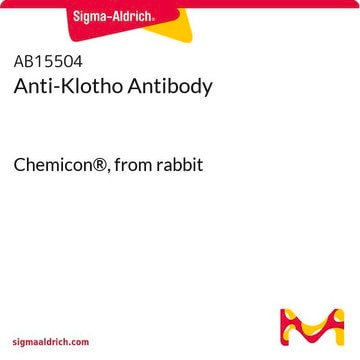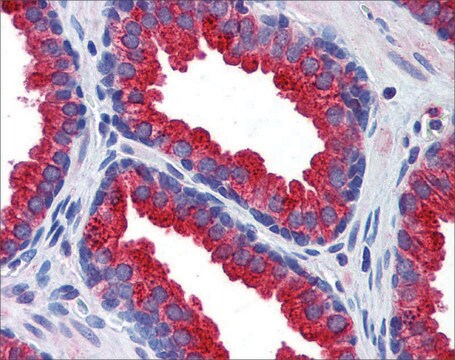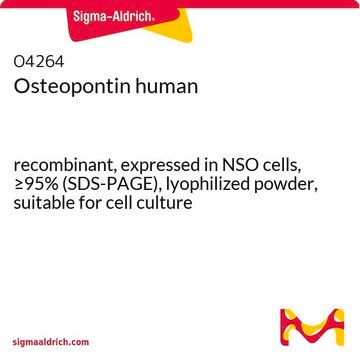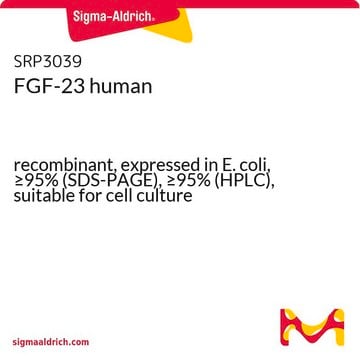SRP3102
Klotho human
recombinant, expressed in CHO cells, ≥98% (SDS-PAGE), ≥98% (HPLC), suitable for cell culture
Synonym(e):
KLA
About This Item
Empfohlene Produkte
Biologische Quelle
human
Rekombinant
expressed in CHO cells
Assay
≥98% (HPLC)
≥98% (SDS-PAGE)
Form
lyophilized
Spezifische Aktivität
0.5—2.0 μg/mL
Mol-Gew.
65-70 kDa
Verpackung
pkg of 20 μg
Methode(n)
cell culture | mammalian: suitable
Verunreinigungen
<0.1 EU/μg endotoxin, tested
Farbe
white to off-white
Eignung
suitable for molecular biology
UniProt-Hinterlegungsnummer
Versandbedingung
wet ice
Lagertemp.
−20°C
Angaben zum Gen
human ... KL(9365)
Allgemeine Beschreibung
Human Klotho exists in both membrane-bound and secreted forms, and is predominantly expressed in the kidney convoluted tubules, and to a lesser extent, in the brain, reproductive organs, endocrine glands, urinary bladder, skeletal muscle, placenta, and colon. The full-length transmembrane form has a large extracellular domain composed of two homologous subunits termed KL1 and KL2, which contain 516 and 439 amino acid residues, respectively, The predominant circulating form, which is derived from alternative RNA splicing, contains the KL1 subunit and constitutes the N-terminal sequence of transmembrane Klotho. A third Klotho protein of about 128kDa has been identified in the blood and cerebrospinal fluid. This circulating protein arises from the action of an as yet unidentified protease which cleaves transmembrane Klotho just above and/or within the plasma membrane. Recombinant human Klotho is a 65-70kDa glycoprotein containing 516 amino acid residues.
Anwendung
Biochem./physiol. Wirkung
Sequenz
Physikalische Form
Rekonstituierung
Lagerklassenschlüssel
11 - Combustible Solids
WGK
WGK 3
Flammpunkt (°F)
Not applicable
Flammpunkt (°C)
Not applicable
Analysenzertifikate (COA)
Suchen Sie nach Analysenzertifikate (COA), indem Sie die Lot-/Chargennummer des Produkts eingeben. Lot- und Chargennummern sind auf dem Produktetikett hinter den Wörtern ‘Lot’ oder ‘Batch’ (Lot oder Charge) zu finden.
Besitzen Sie dieses Produkt bereits?
In der Dokumentenbibliothek finden Sie die Dokumentation zu den Produkten, die Sie kürzlich erworben haben.
Kunden haben sich ebenfalls angesehen
Unser Team von Wissenschaftlern verfügt über Erfahrung in allen Forschungsbereichen einschließlich Life Science, Materialwissenschaften, chemischer Synthese, Chromatographie, Analytik und vielen mehr..
Setzen Sie sich mit dem technischen Dienst in Verbindung.









